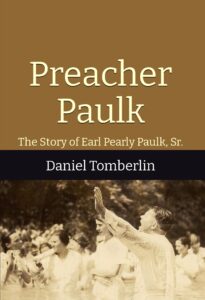Earl Paulk was a second-generation Pentecostal who defied Pentecostal stereotypes. He was not formally educated, but neither was he ignorant. In fact, he was self-educated and well informed. He had a brilliant mind that could collect, collate, and synthesize lots of information.

Paulk was a convinced Pentecostal, but he was not sectarian. He was a cooperative partner with any one committed to sharing the gospel of Christ. But he never compromised his Pentecostal convictions. Also, within the Pentecostal movement, Paulk preferred a conciliatory approach over confrontation. When contentious issues arose at a general assembly, or in a church meeting, Paulk offered a carefully reasoned response.
Paulk was a Pentecostal apologist. He believed that God was to be known in personal encounters of being saved, sanctified, and baptized in the Holy Ghost. He believed in divine healing and in the second coming of Jesus Christ. He wanted to explain and defend the teachings of the Pentecostal movement – to the likes of Norman Greenway, or even the Duke of Windsor. Paulk was not an original thinker, but he embodied the Pentecostal message. To hear him preach, to read his articles, or to listen to him testify was to hear the message of Pentecost.
Paulk was a progressive Pentecostal. He believed in holiness, but he was not legalistic. He believed in sanctification, but he understood the fallen nature of humanity, and understood even more that Jesus Christ is the advocate for sinners. His progressiveness was also demonstrated in his leadership in the National Association of Evangelicals, and as a local pastor. Whereas, many Pentecostals of his era practiced separation and were intolerant of Christians with different convictions, Paulk associated with and sought to influence all who confessed the Lordship of Christ. Paulk’s progressive leadership was demonstrated in his relationships with the press and radio. He was a savvy promoter.
Paulk was a pastor. Even though he rose through the ranks of denominational leadership, in his heart he was a pastor. And, pastoring is where he flourished. In small rural churches in the swamps of southern Georgia, a larger church in the mountains of West Virginia, or as a mega-church pastor in Greenville, South Carolina, he loved and related with people – even those who were waiting to die in the electric chair. And, they loved him. When telling his story, he would talk of being assistant general overseer, and having breakfast with President Kennedy. But when he began to talk about Greenville his countenance changed and he had a glimmer in his eyes.
Paulk pursued excellence in everything he did. There was no place for mediocracy. Church and camp ground lawns must be immaculate, buildings must be properly maintained, and one’s personal presence must be without flaw. Sermons must be adequately researched and properly delivered. For Paulk, the anointing of the Spirit meant being anointed with extraordinary excellence.
Paulk defies the image of a Pentecostal as one who is disinherited and powerless. His vision of being an ambassador of Jesus Christ was that he was empowered with a divine Spirit by the divine King Jesus. He was not intimidated by people in power, nor did he intimidate the common man. He was humble, but bold and confident. He could talk to a child and have breakfast with the President.
Why read Paulk’s story? Does he matter? Paulk was not the only gifted second-generation Pentecostal leader. There were many. But not every Pentecostal leader was known as an evangelist, mega-church pastor, state overseer, assistant general overseer, evangelical leader, and influential in the halls of power. Earl Paulk was among the best of his generation, and a hero to the next generation. If one wishes to understand the development of Pentecostalism, then one needs to know Earl Pearly Paulk.
Excerpted from Preacher Paulk: The Story of Earl Pearly Paulk, Sr.
